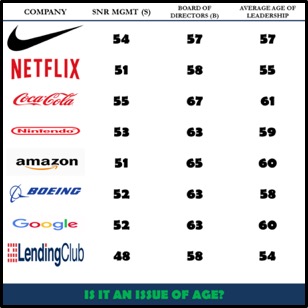4 minutes
In the current no-limits world, winning companies have limitless imagination.
Throughout the halls of most credit union events, you will hear someone issuing to the organization’s leadership an imperative to recruit younger board members, which will help solve the aging membership issue.
As a scholar/thinker/strategist, I ask, is the recruitment of younger board members actually going to solve the problem, or is the problem based on another, masked issue? Having posed that question, I decided to study the leadership ages of companies that are currently winning millennials. The results are shown in the table.
 Based on this, one can definitely see that leading millennial companies have similar leadership ages to that of credit unions; therefore, how are they winning when credit unions aren’t?
Based on this, one can definitely see that leading millennial companies have similar leadership ages to that of credit unions; therefore, how are they winning when credit unions aren’t?
One answer to that is mindset—the mindset that drives the leadership of these organizations to facilitate the pushing of boundaries allows them to win.
A scholar I frequently read material from, Keita Demming, always says that organizations are a combination of people. This means that creating a disruptive organization starts with the mindset of the people.
Famous thought leader and researcher in the area of mindset, Carol Dweck, Ph.D., always speaks about the fixed versus growth mindset, which is often not correlated to age, but is quite visible in leadership.
All of this simply means that replacing the not-so-young people with young people won’t guarantee different results if the mindsets are the same.
So the next question one should ask is, “What is mindset”? According to one source: A mindset is a collection of thoughts and beliefs that shape your thought habits, which affect how you think, the way you feel and what you do.
Basically, a mindset determines how you see the world and the limits of your imagination. In other words, this could be classed as a driver of perspective. If your view of the world of one of stasis, whereby you believe that intelligence is fixed, transitioning is linear and learning is not continuous, you are armed with a fixed mindset.
In the context of a credit union, a fixed mindset is one whereby you think that what got us here will get us there. The dark side of success is always more evident that the uncertain upside of the future.
In addition, the status quo is always maintained, while disruptors and learners are seen as threats. For credit unions to win, a mindset based on learning, imagination and experimentation must be developed. Less focus must be placed on age. As a purpose-driven organization, your “why” must always be member elevation though the “how” may change.
It’s also important to note that mindset impacts human-centred design. If your credit union lacks a mindset of facilitation, learning and experimentation, then most likely it will be designed based on the view of the leaders and not the demands of the membership. The organization may be offering the highest yield on shares, without taking into context that the membership is demanding lower borrowing or specific product types and therefore the outcome will be share withdrawals and high liquidity.
For credit unions to win, the leadership, in spite of the age, must adopt a mindset of facilitation, learning and experimentation. The reality is that if your credit union is facing a millennial and Gen Z challenge, let your current millennial and Gen Z staff who are generation natives deliver the solutions. This means that you must design from the perspective of the target. Older leaders facilitating such a process can help create a win for all involved.
Mindset also trumps age based on its strong positive correlation to organizational culture. The mindset of the leadership set the tone of the organization. If the mindset is one of risk aversion, the culture facilitates that. This means that in the context of the organizational management, anyone who seeks to ascend will adopt the current mindset, regardless of their age. If you replace older with younger without changing the culture/mindset, the results will be the same.
A winning credit union must also be equipped with a mindset which allows imagination. As a leader, you must imagine the impact of your organization if you were to consistently elevate members through meeting their needs at every stage. You would now move from functional to vital! Imagination allows you to experiment and, if you are pursuing a growth mindset according to Dr. Dweck, you would learn from experiments that yield negative results. Modern leaders refer to this as “fail forward.” In the current no-limits world, companies that are winning are the ones with a mindset of limitless imagination which allows the necessary variables to flourish.
In the context of winning millennials and members of Gen Z, leadership age isn’t the variable, but mindset! This is the foundation of the organization and therefore drives the operations. If your credit union isn’t reaching its potential, dissect the mindset, make the necessary adjustments and try again.
I look forward to your comments.
Kwesi Charles is the founder of CredUView Consulting & Cooperative Capital Limited, Trinidad and Tobago.





